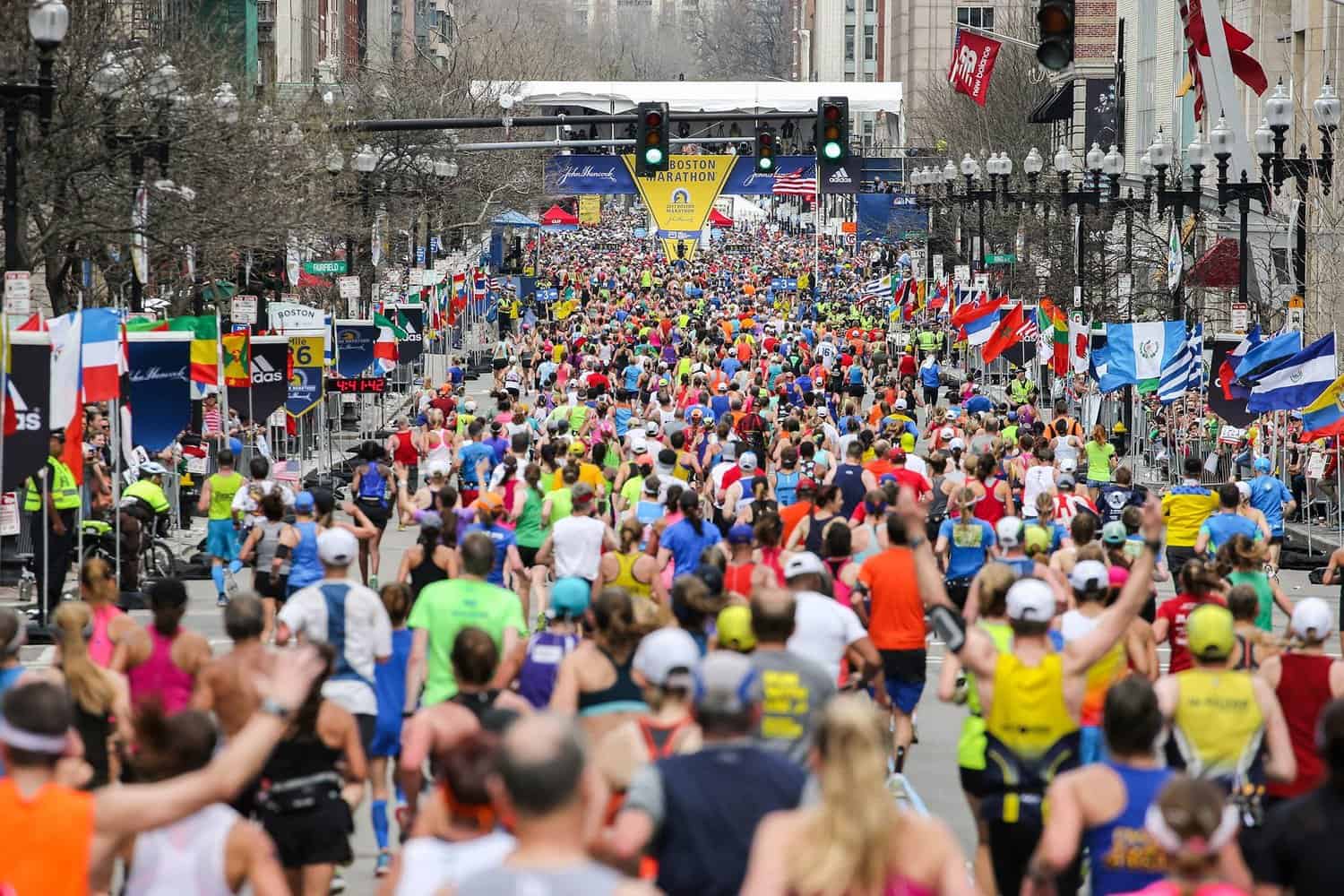You’ve followed your on-the-ground training plan, logging miles, cross training, and incorporating recovery. But training for a half marathon goes beyond how hard you push your body to work. To reach your goals — and minimize your risk of running-related injuries — you need to pay careful attention to how you fuel your body before, during, and after the race, as well as during training.
Running nutrition and hydration are both super important when it comes to crossing the finish line strong versus merely surviving the 13.1 miles. Half marathon nutrition isn’t complicated — but it is strategic, especially if it’s your first half marathon!
As both a registered dietitian and a runner, I advise both clients and myself on the best approach to sports nutrition to maximize energy and recovery, and how to fuel their runs without adding stress to their lives.
Here, I’m sharing running nutrition 101, as well as some of the best foods to eat before and after your race.
Half Marathon Training Nutrition

When you’re training for a half marathon or marathon, nutrition supports your performance and overall well-being. Here’s what to focus on:
1. Make Sure You’re Eating for Enough Energy
The Basics: As training intensity increases, you need to consume enough calories to meet your body’s increased energy requirements. In short, this means fueling with a calculated and balanced combination of carbohydrates, proteins, and healthy fats. This will help sustain your energy levels during long runs and support muscle and joint recovery.
How to Do It: There are a few ways you can determine how many calories you need to sustain your energy:
- As a general rule of thumb, people with a moderate to high level of physical activity need at least 2,500 calories per day. The exact number of calories you need will depend on your weight, height, sex, and training intensity, but this is a less exact number you can go off of.
- Use a simple, scientific calorie calculators, such as this one by the Mayo Clinic and theMifflin-St Jeor Equation. These are helpful to get a frame of reference for how many calories you should be eating to support your training.
- If you’re running for a goal like weight loss, you’ll be better off consulting a sports nutritionist or dietitian. A nutritionist, dietitian or running coach can provide you with an individualized calorie need based on your level of training as well as your weight goals.
2. Focus on Carbs as a Main Fuel Source
The Basics: Carbohydrates are the primary fuel source for any endurance activity. When moving, your body accesses readily-available carbohydrates to turn into fuel. When you don’t have enough carbohydrates in storage, your body will move on to consuming fat reserves for energy, which may sound great but is actually really inefficient.
How to Do It: Whole grains, fruits, and legumes are great sources of healthy carbohydrates that provide a steady release of energy.
As a long-distance runner, 50% of your daily total calories should be made up of carbohydrates.
As an example, a very active 154-lb (70kg) male athlete needs about 2900 calories per day, according to the Mayo Clinic calculator. Around 1,450 of those calories should come from carbohydrates (>50%), which equates to 350 to 400 grams of carbs per day.
That may sound like a lot, but if you just focus on incorporating a generous portion of complex carbohydrates into each meal, you’ll hit your goal, no sweat.
This may look like:
- Breakfast: 1 cup oats with sliced banana and peanut butter made with 1 cup milk (100g carbs)
- Snack: Apple (30g carbs)
- Lunch: Sandwich with hummus, lettuce, tomato, and sliced meats. Orange and crackers on the side (100g carbs)
- Snack: 1 cup Greek yogurt with berries (30g carbs)
- Dinner: 1 cup cooked rice, roasted veggies and chickpeas, and chicken breast (100g carbs)
Total: ~360g carbohydrates
In addition to the average day-to-day carbohydrate intake, aim for a carb-rich meal or snack before long training runs to top up your muscle glycogen stores. This might look like a banana, oats, fruit, sweet potato, dried fruit, or toast.
3. Give Your Muscles Protein to Repair With
The Basics: Protein plays a crucial role in repairing and rebuilding muscles damaged during training runs. Include lean sources of protein, as opposed to high-fat protein, such as poultry, fish, eggs, tofu, or legumes daily.
How to Do It: As a general rule of thumb, athletes require >1.2g of protein per kg of body weight per day.
When it comes to timing, there are two important things to keep in mind:
- Spread your daily protein intake out evenly throughout the day. Each meal should contain at least 20g of protein.
- During running training and cross-training, try to consume protein within 30-60 minutes after a workout to help optimize recovery.
Many of us have no problem meeting our protein quota at dinnertime. But many of us fall short at breakfast. A good goal is to make sure your breakfast as a runner contains at least 20g of protein.
This could look like a combination of:
- Eggs: 14g (2 eggs)
- Peanut butter: 7g (2 tbsp)
- Cottage cheese: 12g (1/2 cup serving)
- Lentils: 18g (1 cup cooked)
- Lean beef: 22g (3 oz serving)
- Chicken: 27g (3 oz serving)
- Salmon: 19g (3 oz serving)
4. Focus on Hydration to Replenish Sweat Loss
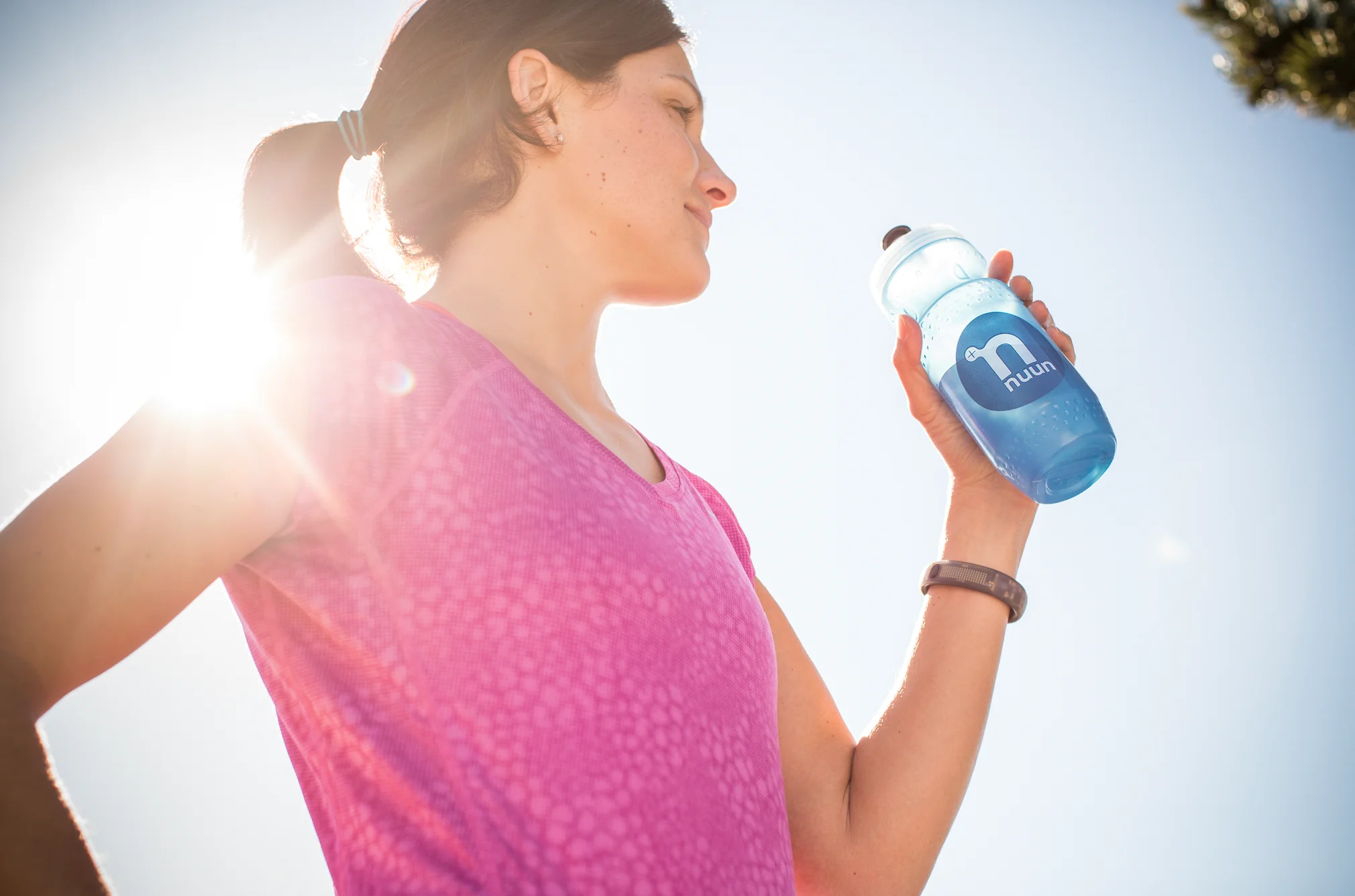
The Basics: Proper hydration is vital for performance, recovery, and cellular function.
How to Do It: Stay hydrated by drinking water throughout the day and especially before, during, and after training sessions. If you are thirsty, drink!
During longer runs, consider incorporating sports drinks or electrolyte supplements to replenish sodium and other essential electrolytes lost through sweat.
5. Time Your Meals Smartly
The Basics: You want to time your meals and snacks to allow enough time for your body to digest everything, but also not too far in advance so that the fuel is no longer a readily available energy source.
How to Do It: Aim to eat a meal or snack about two to three hours before a training session. Aim to eat the balance of carbohydrates, protein, and fats outlined above.
This might look like 1% yogurt with berries, a banana with peanut butter, egg and toast, or a protein bar.
6. Dial in Your Nutrition Before Race Day
The Basics: It is important to eat what you’re already familiar with on race day. Race day is NOT the time to experiment with a new breakfast! After all, the last thing you want is stomach cramps – or worse GI issues that have you sprinting for the nearest porter potty.
How to Do It: Over the course of your 8 weeks of training or 20 weeks of training, dial in what breakfast and mid-run snacks your body responds best to. Practice fueling during training to ensure you are comfortable with consuming certain foods and drinks before running.
What to Eat the Week Before a Half Marathon
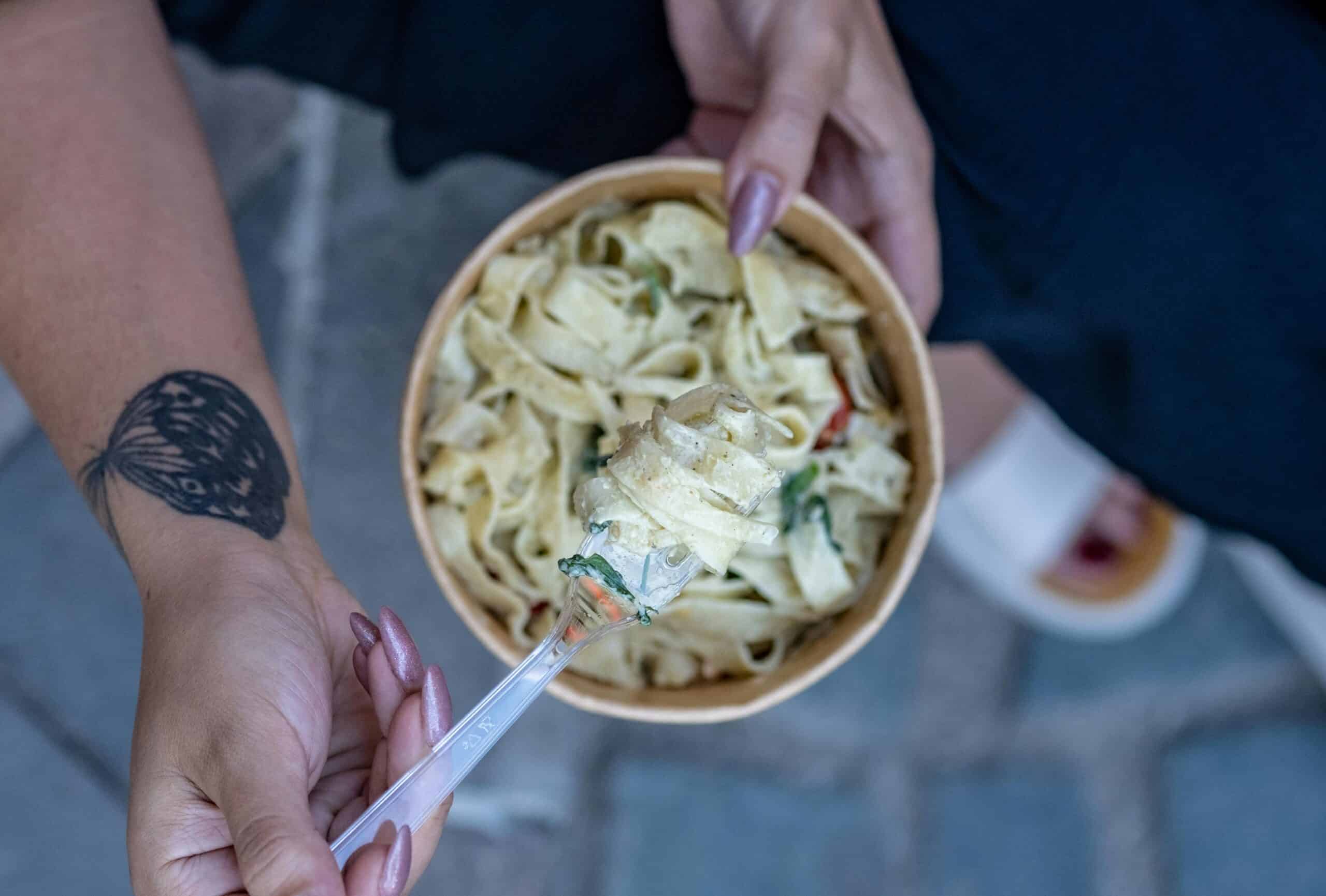
We have a comprehensive plan outlining everything you should know about what to eat the week before your half marathon. But here are the basics:
- The week leading up to the race, gradually increase your carbohydrate intake to top up your muscle glycogen stores while you taper. This is also known as carb-loading. Focus on easily-digestible carbohydrates such as pasta, breads, sweet potatoes, cereals, rice, and fruits into your meals. These won’t sit too heavily in your stomach, unlike whole grains and fiber-rich foods.
- The week before your race, decrease fat and fiber intake. This goes against every piece of nutritional advice for when you’re not training. But both of these take longer to digest, sit heavily in the stomach, and don’t help build your glycogen stores.
- Stick to foods you know and like the week and day before the race. This is not the time to experiment with several new foods or supplements. Stick to foods you know work well for your digestive system and have proven successful during your training.
- The night before your half marathon, eat a carbohydrate-rich and simple meal. This may look like pasta, a rice bowl, or a sandwich.
- Remember, carb-loading is not a one-day event but a gradual process over several days. Distribute your carbohydrate intake evenly throughout the week, rather than relying solely on one large meal the day before the race. It’s a marathon, not a sprint!
What to Eat the Morning of Your Half Marathon
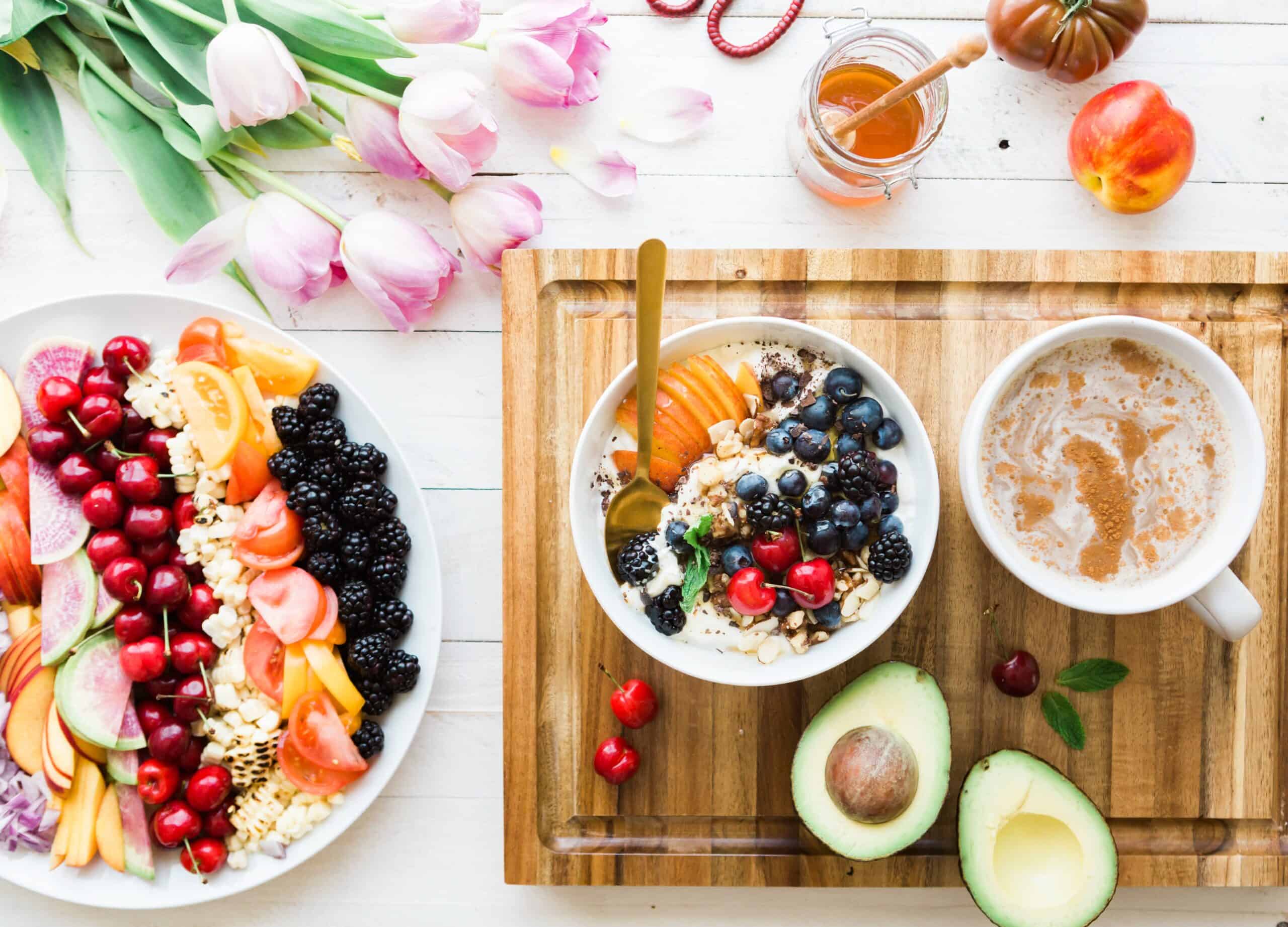
In the two to four hours before the race, eat protein, simple carbs, and fluids. Again, avoid high fiber, high fat, and any new foods, which may cause digestive issues.
Good choices for race day breakfast include a combination of any of: toast, bagel, cereal, fruit, small amounts of peanut or almond butter, low-fat cheese, low-fat milk, or a fruit smoothie.
Race day is not the time to try a new breakfast. Stick to what you know and what you know your body will tolerate.
In the few minutes prior to the race, have some sips of water or sports drinks. If you’ve trained with energy gels or chews, have one 5 minutes before the start of your half marathon.
What to Eat During a Half Marathon
During any event longer than one hour, which, for most people, includes a half marathon, athletes should be thinking about fuel sources. Here are the best recommendations for in-race nutrition:
- Carbohydrates: Consume 30-60 grams of carbohydrates per hour of running. This should come from easily digestible sources such as energy running gels, sports drinks, gummies, bananas, pretzels, or energy bars. Your body can use glucose for immediate energy. Experiment with different options during your training to find what works best for you.
- Hydration: Consume 1 bottle (750ml) every hour of running. If you have a high sweat rate or it’s very hot outside, increase this amount. Consider using a sports drink (rather than plain water) to replenish electrolytes lost through sweat, such as Nuun, Skratch Labs, or LMNT, or Tailwind.
- Electrolytes: Any event longer than an hour typically requires electrolyte replenishment. Along with hydration, replenishing electrolytes is essential to maintain proper muscle function and prevent cramping. Look for sports drinks or electrolyte supplements that provide sodium, potassium, magnesium, and other electrolytes.
- Calories: Aim for 100-200 calories per hour during an endurance event. This should come from carbohydrates for the most part. To meet this calorie requirement, you’d need to consume 25-50g of carbohydrates per hour, which aligns with the carbohydrate requirement outlined above.
Remember, these recommendations are general sports nutrition guidelines. Individual needs may vary from person to person. Consider consulting with a registered dietitian or sports nutritionist for personalized advice based on your specific needs and goals.
What to Eat After a Half Marathon
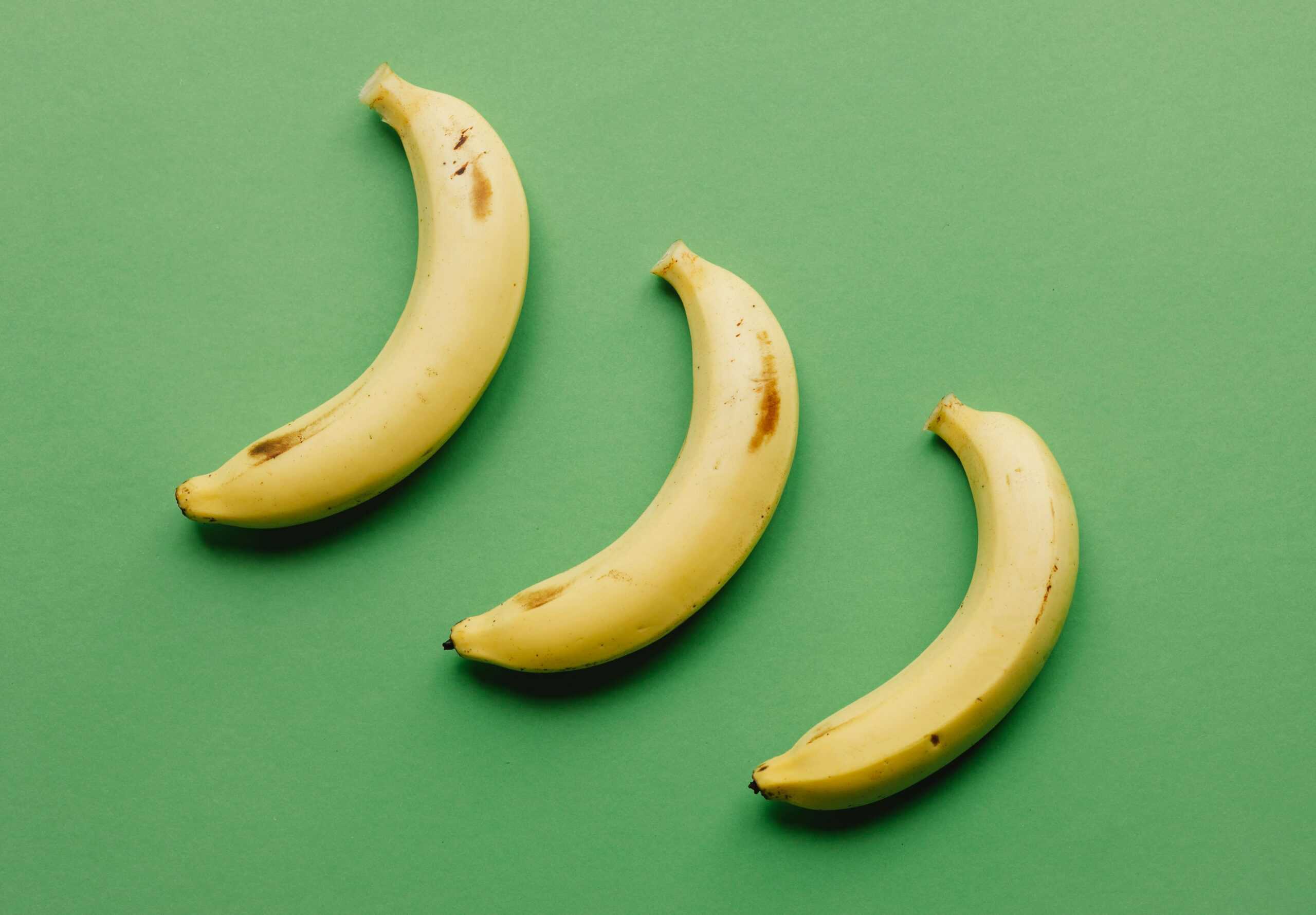
We have a comprehensive plan outlining everything you should know about what to eat after your half marathon. But here are the basics:
- Avoid chugging plain water. You want to rehydrate but this will cause your blood sodium levels to drop, causing exercise-associated hyponatremia (EAH). Instead, add an electrolyte tablet like LMNT or Nuun to your water to avoid EAH.
- Drink juice or a sports drink to replenish the fluids lost during the race. Aim to drink enough to satisfy your thirst, while taking small sips.
- Eat a post-race meal within 30-60 minutes of finishing. This window of time is when your body is most receptive to nutrient absorption and muscle recovery. A solid meal to refuel after a race includes carbohydrates, lean proteins, and antioxidants, like grilled chicken with brown rice and steamed vegetables or a tofu stir-fry with quinoa and mixed greens. A balanced meal after your race will optimize your recovery, muscle building, and immune system.
- If you can’t have a full meal immediately after the race, opt for a nutrient-dense snack. This could be a protein shake or smoothie with fruits and Greek yogurt, a handful of nuts with a piece of fruit, or a protein bar.
Remember to focus on recovery also by resting, stretching, and allowing your body time to recover properly.
Half marathon nutrition FAQ
Limit your intake of highly processed and junk foods that are high in unhealthy fats, added sugars, and low in nutritional value. You should also reduce your alcohol intake to zero if possible. These foods can lead to poor recovery, inflammation, and hinder your training progress.
Consume a total of 30-60g of carbohydrate per hour in bouts of 15-30 minutes.
This depends on your nutritional needs. But in general, consume a carbohydrate-rich meal 2-3 hours before the race, which contains 400-500 calories. During your race, consume 100-200 calories per hour in the form of rapidly digestible carbs. Post-race, have a meal that is balanced in lean proteins and carbs that provides 400-800 calories.
Eat rapidly digestible carbs like sports gels, sports drinks, gummies, bananas, or energy bars.
Your diet during half marathon training should consist of at least 50% of your total calories or 5-10 grams of carbohydrate per kg of body weight per day.
As a general rule of thumb, athletes require >1.2g of protein per kg of body weight per day while training.
In the two to four hours before the race, eat protein and simple carbs and drink fluids. Again, avoid high fibre, high fat, and new foods, which can cause digestive issues.
Good choices for race day breakfast include a combination of any of: toast, bagel, cereal, fruit, small amounts of peanut or almond butter, low-fat cheese, low-fat milk, or a fruit smoothie. Many athletes enjoy toast with peanut butter and banana, or oatmeal with berries.



